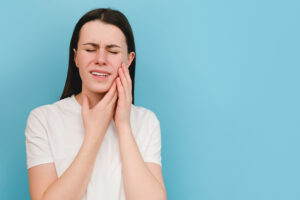 Suffering from persistent headaches is incredibly frustrating. It makes it extremely difficult to focus and can derail even the smallest of tasks. It is even worse when you can’t seem to figure out what’s causing it. We know that dehydration, stress, and a lack of sleep can exacerbate them, but what does it mean when these factors are not the cause? In some cases, headaches can be caused by TMJ Disorder. This, in turn, can be caused by bruxism, and both of these issues stem from jaw issues. If you suffer from either of these, do not hesitate to bring it up in your next dental exam, so we can figure out the appropriate treatment. In today’s blog, your Woodland Hills, CA, dentist discusses both disorders and describes how we can solve them.
Suffering from persistent headaches is incredibly frustrating. It makes it extremely difficult to focus and can derail even the smallest of tasks. It is even worse when you can’t seem to figure out what’s causing it. We know that dehydration, stress, and a lack of sleep can exacerbate them, but what does it mean when these factors are not the cause? In some cases, headaches can be caused by TMJ Disorder. This, in turn, can be caused by bruxism, and both of these issues stem from jaw issues. If you suffer from either of these, do not hesitate to bring it up in your next dental exam, so we can figure out the appropriate treatment. In today’s blog, your Woodland Hills, CA, dentist discusses both disorders and describes how we can solve them.
TMJ Disorder Can Be Very Painful
TMJ Disorder is marked by the joints that connect your lower skull to your jaw becoming misaligned. This can cause jaw pain in addition to headaches, earaches, and even debilitating migraines. These joints contain significant nerve clusters, which contributes to how painful this disorder can be. To further complicate matters, these joints are also almost always in motion; they are responsible for chewing and speaking, so they never have much time to heal on their own. In addition to causing the aforementioned issues, TMJ Disorder can also cause bruxism, or persistent teeth grinding. Interestingly, teeth grinding can also be responsible for causing jaw misalignment.
Bruxism Can Damage Your Smile
Bruxism refers to persistent — typically unconscious — teeth grinding. It can occur either while you are asleep or are awake; either way, you probably aren’t aware that you are doing so. It is usually caused by stress, anxiety, or TMJ Disorder. If it is caused by external, emotional factors, your doctor can suggest ways to alleviate your stress. If it is caused by a jaw misalignment, there are dental appliances that can help mitigate damage. Bruxism is particularly tricky because those suffering from it aren’t always aware they are doing it. When this is the case, significant damage can befall their teeth before they notice it is happening.
We Can Treat Both Issues
Both Bruxism and TMJ Disorders have similar treatment options. For each, your oral health care professional can make you a custom-crafted mouthguard to wear while you are sleeping. For bruxism, the night guard will prevent your teeth from grinding and clenching together. For TMJ Disorder, it will move your jaw into a proper alignment. Because these appliances are made specifically for your unique mouth, you will adjust to wearing them quickly, as it will be more comfortable than you expect.
Contact Us To Learn More About Bruxism And TMD
Whether you suffer from bruxism and TMJ Disorder or you have questions in general, we are here to help. You can schedule an appointment by calling your Woodland Hills, CA dentist, Dr. Naminik, by calling 818-347-5124.



